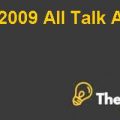
Graves Industries
Introduction
Graves Industries Inc. was a manufacturer of industrial hardware and tooling. The company was listed on NYSE and thus the company’s management had a responsibility towards the shareholders of the company. The companies, which are listed on the stock exchanges, are usually reviewed by analysts and the share price of the company is heavily dependent on the steady stream of profits.
Discussion
The company has been performing well since its inception because of its proper capitalization on the opportunities and continuous watch on the threats posed on the company because of the external environment. Graves Industries focused on strategic planning and budgeting by going through internal and external analysis. The company had an internal audit system, which was responsible for keeping a check and balance on the company system and its financial situations.
As a matter of fact, the sales of Graves Industries were up to 12% in 1985 and the operating profits increased by 13%. It had a target of 8% in sales and profits, which was consistently achieved; even in the rough times when the economy was hurt by the fuel crisis and other related issues.
Problem Statement
The president of the consumer division, Leo Gladue along with the controller and financial officer of Lohnes Marine Hardware Division noticed that their division’s financial results were manipulated to a large extent. There was a possibility that some of the management was involved in illegal reporting of the financial statements for various reasons that had to be identified by them.
Analysis
Graves Industries operated in high growth environment. Thus, the company was achieving the challenging targets easily. However, with the inception of Flexible manufacturing system (FMS), a computer integrated manufacturing system, the company’s profitability situation had a threat of turning around as more and more pressure was being put on the company to increase the revenue growth and reduce the costs to assist the FMS division.
The first and foremost reason that triggered the unprofessional conduct was the high management Incentive plan (MIP), which was initiated to motivate the personnel of the company. According to this plan, the annual cash awards were based on the actual vs. budgeted level of targets. The high payout through this plan encouraged the management to enter into practices that would help them to achieve these bonuses. The payout gets flats after 100-105% targeted RONA achievement. So there is no additional incentive of achieving more than this level.
The issue was with the sales cycle of the company. In some years, the company was able to meet its revenues in the early quarters of the financial years whereas, for others it was very difficult to manage the targets of 8% growth for the company. The year 1983 was relatively good for Lohnes Marine Hardware Division but Paul Lohnes wanted to create a system through which the sales would get smoothened in the anticipated downturn period that is to arrive soon.
The reporting was forged without the consent of Don, the controller and financial officer of Lohnes Marine Hardware Division. The shipping moratorium was declared when the targets of the previous quarter were nearly achieved. Thus, some of the sales were shifted to the next quarter deliberately to smoothen the sales for both periods. However, this caused shipment delays and increased consumer complaints..............
This is just a sample partial case solution. Please place the order on the website to order your own originally done case solution.













